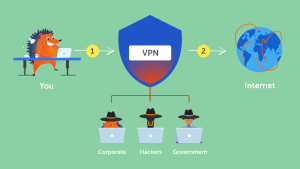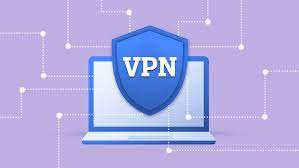Free VPN for school Wi-Fi is a great way to protect your privacy and surf the web securely. While most schools offer free Wi-Fi, they often block access to certain websites and impose restrictive filters. A VPN can bypass these restrictions and give you unrestricted access to the internet.
Do you use free VPN for school Wi-Fi. to access the internet? If so, you need to be careful! School networks often unsecured and open to anyone who wants to use them. As a result, your personal information is at risk of being stolen or accessed by third parties.
This blog post will discuss how a VPN can help you stay safe online using public Wi-Fi networks. We will also recommend some of the best free VPNs for school Wi-Fi connections. So, keep reading the article free VPN for school Wi-Fi.
What is a VPN?
A VPN, or virtual private network, is a service that creates a secure, encrypted connection between your computer and the VPN server.
That allows you to safely send data over the internet while keeping your information private from prying eyes. VPNs can use for various purposes, including keeping your online activity private, accessing region-locked content, or avoiding censorship. Whatever your reasons for using one, here’s everything you need to know about VPNs.

Businesses often use VPNs to allow employees to connect to the company network remotely. However, they can also use to spoof your location and access region-restricted content. This blog post will explain what a VPN is and how it works. We’ll also discuss the benefits of using a VPN and offer tips for choosing the right VPN.
So, how does it works? First, a VPN creates a secure, encrypted connection between your computer and the VPN server. This tunnel prevents anyone from eavesdropping on your traffic or intercepting your data.
When you connect to the internet through a VPN, all your data is sent through this encrypted tunnel. Unfortunately, your ISP (internet service provider) and government agencies can’t see what you’re doing online.
Your data is also safe from hackers since they need to decrypt your traffic to read it. That’s why businesses and security-conscious individuals often use VPNs.
Now that you know how a VPN works let’s take a look at some of the benefits of using a VPN.
Benefits of Using a VPN
There are many benefits of using a VPN, including the following:
– Privacy: When you connect to the internet through a VPN, your data is encrypted, and your ISP can’t see what you’re doing. That means your online activity is private and only visible to you.
– Security: Businesses often use VPNs to protect their data from hackers. By encrypting your traffic, a VPN makes it much harder for hackers to intercept your data or steal your information.
– Save money: Many online services offer lower prices if you connect from a different country. With a VPN, you can spoof your location and save money on airfare, hotel bookings, and car rentals.
How to Choose the Right VPN
Not all VPNs are created equal. When choosing a VPN, there are a few things you should keep in mind, including the following:
– Security: Ensure the VPN uses strong encryption and a good security protocol. The best VPNs use 256-bit AES encryption and offer a variety of security protocols, such as OpenVPN, IKEv0/IPsec, and SSTP.

– Privacy: Find out what kind of logging the VPN provider does and how they handle your data. The best VPNs don’t keep logs of your activity and will protect your privacy at all costs.
– Speed: A VPN will slow down your internet connection, so you’ll want to find a provider that offers fast speeds. Using compression and other optimization techniques, the best VPNs can even improve your connection speed.
– Customer support: If you have any problems with your VPN, you’ll want to be able to contact customer support for help. The best VPN providers offer 24/seven customer support through live chat or email.
Why do you need one for school Wi-Fi networks?
There are a few reasons. The first is that many school Wi-Fi networks are unsecured, meaning anyone can connect. It includes people who might be trying to steal your personal information or hack into your devices.
Another reason is that even if the school Wi-Fi network is secure, it’s often not very private. That’s because your school can see what you’re doing online. For example, they might be able to track which websites you visit and what you do on them.
A VPN can help you protect your privacy by encrypting your traffic and making it harder for people to snoop on your activities. It can also help you bypass restrictions on school Wi-Fi networks.
We’ve covered you if you’re looking for a VPN on your school’s Wi-Fi network. Read on to learn about the best free VPNs for school.
Best Free VPNs for School
A few good free VPNs can be used for school Wi-Fi networks. Here are our top three picks:
Windscribe is a great free VPN for schools because it offers strong security and privacy features. It uses 256-bit AES encryption and offers a variety of security protocols, such as OpenVPN, IKEv0/IPsec, and SSTP. Windscribe also doesn’t keep logs of your activity and has a strict no-logs policy.
ProtonVPN is another excellent free VPN for schools. Its strong security features, including 256-bit encryption and perfect forward secrecy. ProtonVPN also has a strict no-logs policy, so your activities remain private.
TunnelBear is a good free option if you’re looking for a simple VPN for school. It’s easy to use and has strong security features, including 256-bit encryption. TunnelBear also doesn’t keep logs of your activity, so your privacy will protect.
How to get a free VPN for your device
Did you know you can get a free VPN for your phone, computer, or tablet? This blog post will show you how to get a free VPN and what to look for in a good one. We will also explain why using a VPN is important and how it can protect your privacy.
A free VPN is a software program you can download and install on your device. Once installed, the VPN will encrypt all of your internet traffic so that it cannot be intercepted or read by anyone else. This includes your ISP, school, and government agencies that may be snooping on the network. A free VPN will also hide your IP address so you can surf the web anonymously.
Tips for staying safe and anonymous online when using public Wi-Fi networks
Public Wi-Fi networks can be a lifesaver when you need to get online and don’t have internet access at home or work. However, using these networks comes with some risks. This post will give you some tips for staying safe and anonymous when using public Wi-Fi networks.
– Use a VPN: A VPN, or virtual private network, is a great way to add an extra layer of security to your internet usage. When you use a VPN, all your internet traffic will rout through an encrypted tunnel so that anyone who tries to intercept it will only see gibberish. This includes your ISP, school, and government agencies that may be snooping on the network.
– Use a Secure Browser: A secure browser is another great way to protect your privacy when using public Wi-Fi networks. A secure browser will encrypt all of your internet traffic so that it can’t be intercepted or read by anyone else.
– Keep Your Software Up to Date: One of the best ways to protect your device from online threats is to ensure that all of the software is up to date. This includes your operating system, web browser, and any apps you use.
Conclusion
We’ve got you covered if you’re looking for a free VPN for school Wi-Fi. In this blog post, we’ve shared our top picks for the best free VPNs for school. We’ve also included some tips for staying safe and anonymous online when using public Wi-Fi networks.






